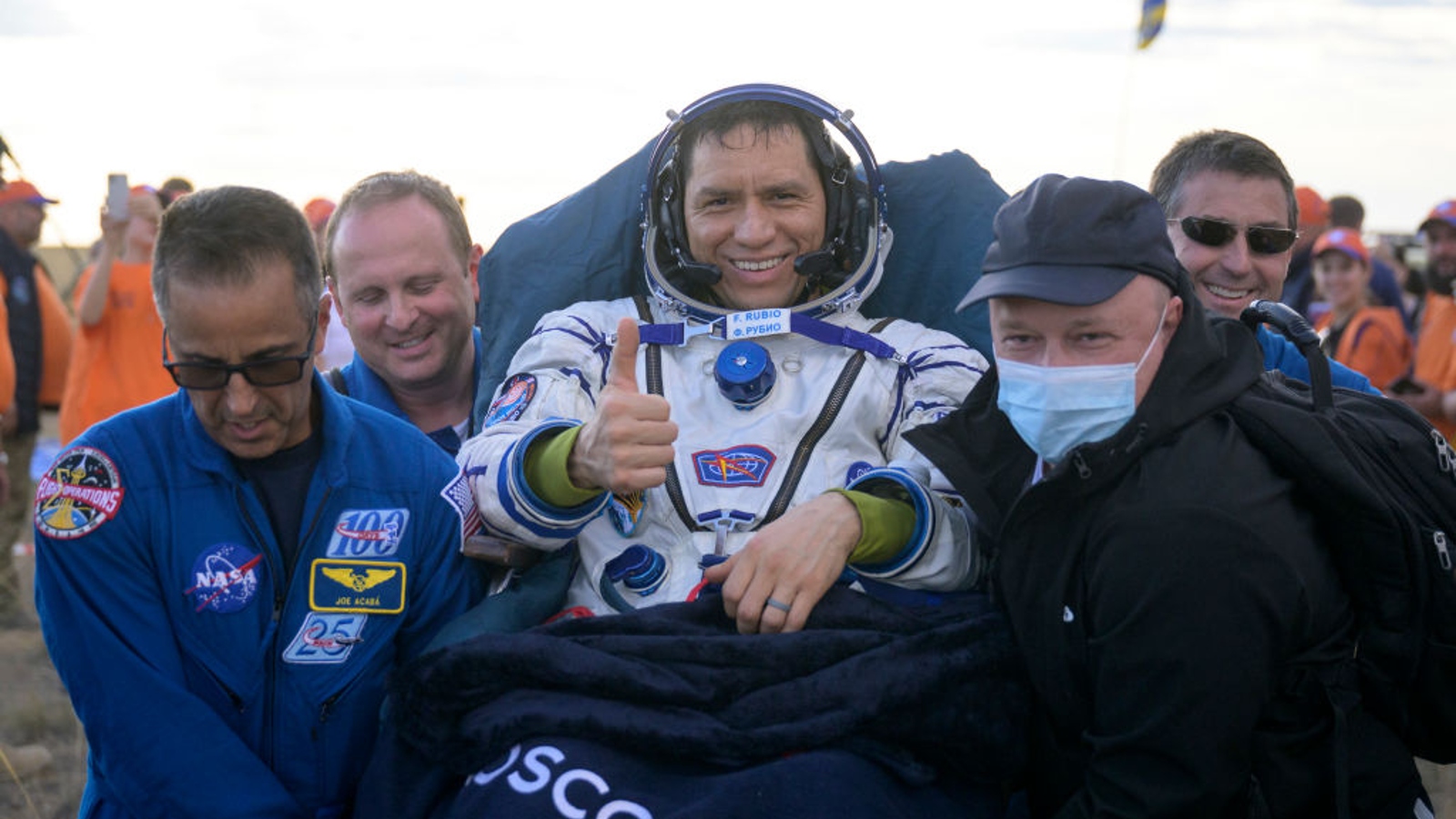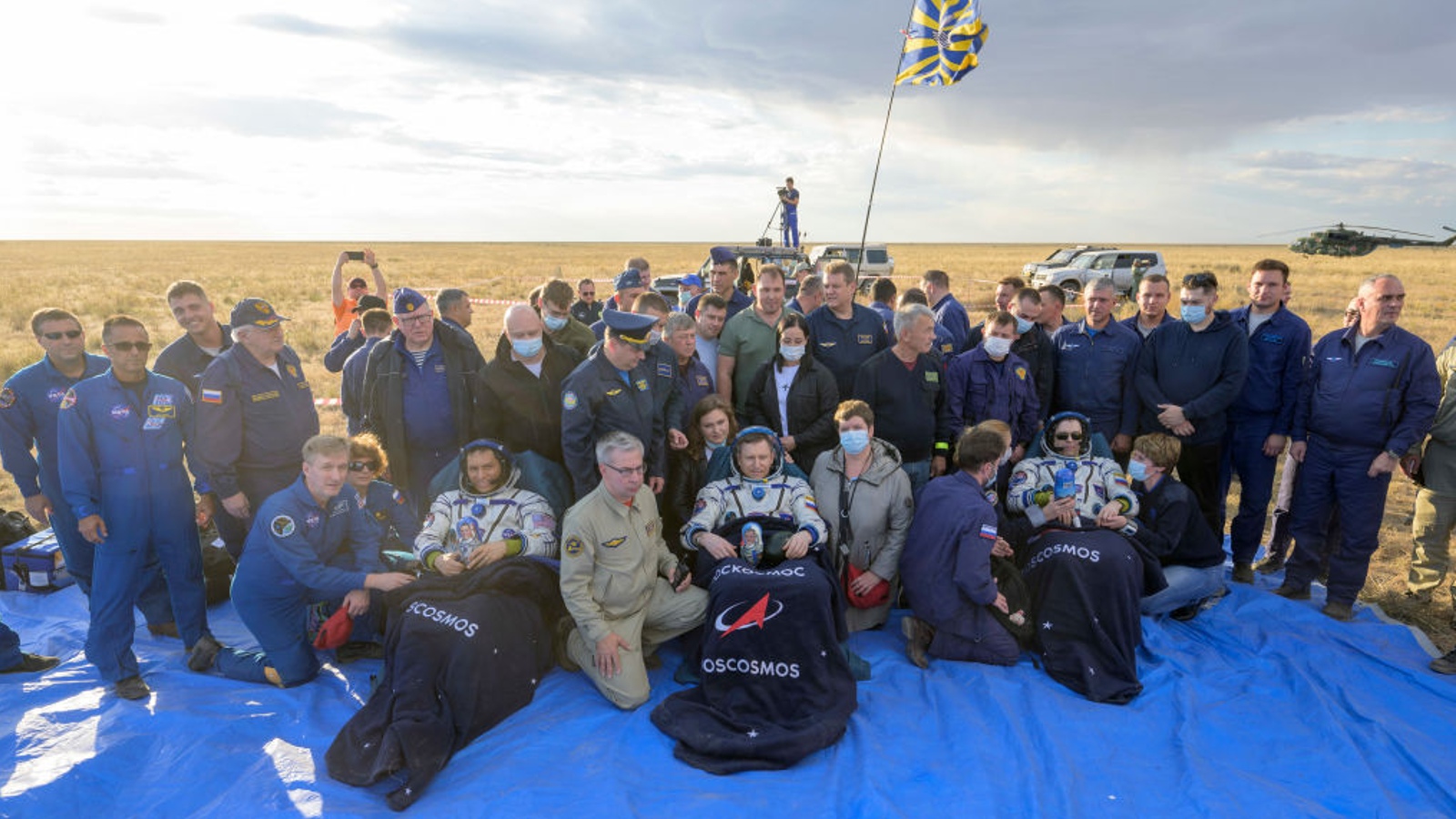Record-breaking astronaut Frank Rubio finally returns to Earth after accidentally spending 371 days in space
NASA astronaut Frank Rubio has finally returned home from a 371-day stay on the International Space Station — a record for an American — after being trapped when his ride home was damaged.
Get the world’s most fascinating discoveries delivered straight to your inbox.
You are now subscribed
Your newsletter sign-up was successful
Want to add more newsletters?

Delivered Daily
Daily Newsletter
Sign up for the latest discoveries, groundbreaking research and fascinating breakthroughs that impact you and the wider world direct to your inbox.

Once a week
Life's Little Mysteries
Feed your curiosity with an exclusive mystery every week, solved with science and delivered direct to your inbox before it's seen anywhere else.

Once a week
How It Works
Sign up to our free science & technology newsletter for your weekly fix of fascinating articles, quick quizzes, amazing images, and more

Delivered daily
Space.com Newsletter
Breaking space news, the latest updates on rocket launches, skywatching events and more!

Once a month
Watch This Space
Sign up to our monthly entertainment newsletter to keep up with all our coverage of the latest sci-fi and space movies, tv shows, games and books.

Once a week
Night Sky This Week
Discover this week's must-see night sky events, moon phases, and stunning astrophotos. Sign up for our skywatching newsletter and explore the universe with us!
Join the club
Get full access to premium articles, exclusive features and a growing list of member rewards.
Dr. Frank Rubio, the first American astronaut to live in space continuously for more than a year, has returned to Earth. He spent 371 consecutive days on the International Space Station (ISS), eclipsing the nearly yearlong stints of astronauts Mark Vande Hei (355 days) and Scott Kelly (340 days). The record-setting trip was more than twice as long as originally scheduled.
Rubio, along with Russian cosmonauts Sergey Prokopyev and Dmitri Petelin, touched down in rural Kazakhstan on Sept. 27. They were pulled out of their Soyuz capsule and carried away because they were unable to walk due to their extended stay in microgravity.
Rubio, Prokopyev and Petelin arrived on the ISS aboard a Soyuz capsule on Sept. 21, 2022. They were due to return to Earth on March 28 but had to remain in space after their spacecraft was hit by a piece of space junk or meteoroid in December 2022, which caused an uncontrollable radiator leak. The unrepairable capsule was returned to Earth and was replaced by another uncrewed capsule in February, which the trio used to return home.
Due to other scheduling conflicts, Rubio, Prokopyev and Petelin had to remain aboard the ISS until now. But Rubio's extended stay provides an unexpected opportunity to learn more about prolonged spaceflight.
"Frank's record-breaking time in space is not just a milestone; it’s a major contribution to our understanding of long-duration space missions," NASA Administrator Bill Nelson said in a statement. "He embodies the true pioneer spirit that will pave the way for future exploration to the Moon, Mars, and beyond."
Related: Why does NASA let male astronauts stay in space longer than females?
The previous record spaceflight by an American was held by Vande Hei, who spent 355 consecutive days on board the ISS between 2021 and 2022. But the longest-ever consecutive time spent in space was a whopping 437 days, which was set by cosmonaut Valeri Polyakov between 1994 and 1995.
Get the world’s most fascinating discoveries delivered straight to your inbox.
During his mission, Rubio completed approximately 5,936 orbits of Earth, which equates to around 157 million miles (253 million kilometers), or roughly 328 trips to the moon and back, according to NASA. He also carried out three spacewalks totaling around 21 hours and had 28 different crewmates on the ISS.
In a Sept. 19 interview on board the ISS, Rubio explained that it had been hard to be away from his family for such a long time but that he had tried hard to "stay positive" during his extended mission. "You try to just focus on the job and on the mission and remain steady, because ultimately, every day, you have to show up and do the work," he said.
Related: How long could a person survive in space without a spacesuit?
Rubio conducted a variety of scientific experiments during his time in space, including testing how bacteria behave in microgravity. But his favorite experiments were carried out on a tomato plant. "I love working with that little plant and seeing it grow and develop," he said.
It will be particularly interesting to see how well Rubio adjusts to life back on Earth. Prolonged time in space can cause muscle degeneration, bone loss, reduced eyesight and impaired balance, and can even change the shape of the brain. The recent record-breaking mission was Rubio's first time in space, which means his body has not experienced any of these issues before. He predicts that it could take two to six months to feel completely normal again.

Harry is a U.K.-based senior staff writer at Live Science. He studied marine biology at the University of Exeter before training to become a journalist. He covers a wide range of topics including space exploration, planetary science, space weather, climate change, animal behavior and paleontology. His recent work on the solar maximum won "best space submission" at the 2024 Aerospace Media Awards and was shortlisted in the "top scoop" category at the NCTJ Awards for Excellence in 2023. He also writes Live Science's weekly Earth from space series.
 Live Science Plus
Live Science Plus













